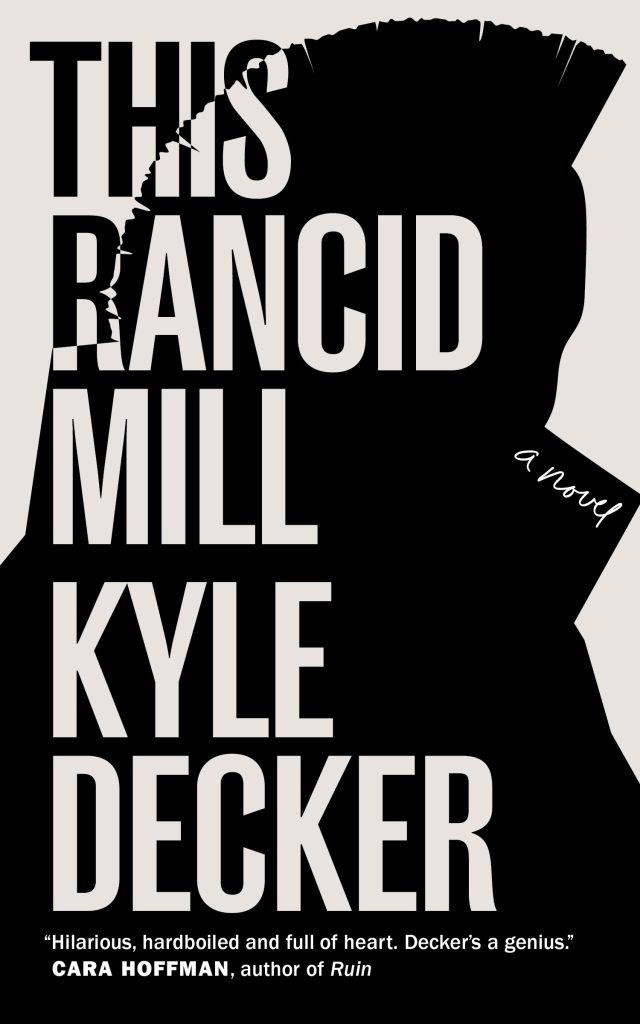By Zachary Kocanda
Heavy Feather
The main character of Kyle Decker’s novel This Rancid Mill doesn’t fit the bill of a typical detective. Maybe it’s the three-inch-high blue mohawk. Or the Dead Kennedys patch on his leather jacket. Or the one-liners like: “It took me the span of a Dee Dee Ramone count-off to decide she was my kind of crazy.”
Decker’s antihero, Alex Damage—real last name DiMaggio, if he absolutely has to tell you—is a twenty-two-year-old punk private investigator who works out of his messy studio apartment. He knows the ins and outs of the Los Angeles hardcore punk scene. He’s done lots of favors for lots of people in the scene—if he stops by a show, he probably knows the door guy. This gives him the perfect credentials to dig up dirt for clientele who’d rather not use conventional channels—“cops and punks don’t much care for each other,” he notes. It’s his reputation that keeps him in business: “It’s enough to keep me out of the gutter and gives me something to do,” as he puts it. And it pays for the In-N-Out burgers and booze his body runs on.
Enter Bad Chemicals, a local punk band fronted by the charismatic Jerry Rash, whose songs include “Cop-a-Feel” and “Burn It Down.” The novel opens with Damage recovering the morning after seeing the band live at the Starwood nightclub in West Hollywood—not for a job; he’s just a big fan, and friendly with Rash. But soon he’s got a new case. He returns to the club for his jacket and stumbles into a vigil packed with crying punks. Rash died of an overdose after the show in what appears to be an open and shut case, but Rash’s girlfriend suspects foul play—and she points the finger at Rash’s estranged wife. It only gets more complicated from there. Damage soon uncovers secrets about the dark underbellies of the punk scene, and he’s confronted with revelations that force him to reevaluate everything he thought he know about a person he idolized. Damage lays it all out:
I had started out on this thinking it was a normal, everyday, run-of-the-mill murder with an obvious suspect with a clear motive. To be fair, that’s because most of the time, that’s exactly what it is. […] Was I in over my head? Absolutely. But honestly, that’s the only time I can really breathe.
This Rancid Mill includes many action-packed scenarios that could only happen to detective who also loves to mosh. It’s a hostile work environment, to say the least—but the music’s fucking great. In one scene, Damage confronts a person of interest—the front man of another punk band—by crowd surfing to the stage during the band’s set at Whisky-a-Go-Go. Damage helps the speechless punk by shouting the song’s lyrics into the microphone, then whispers into his ear that they have to talk after the show, before jumping back into the crowd. Later, a stranger uses the cover of a rowdy crowd to rough Damage up. “He pushed his way into the pit and hit me, but not in a mosh-pit kind of way. The fucker was out to hurt me,” he realizes. The band plays on, the crowd none the wiser of the attack, and Damage struggles to hold his own: “He kept trying to get me to go down; he wanted to trample me and make it look like an accident.” Damage’s friend saves him just in time. All in a day’s work.
But even a punk has to hit the books. As part of his investigation, Damage pores over records at the public library, and like his protagonist, Decker too has paid careful attention—and done considerable research—to authentically recreate early-1980s Los Angeles on the page. The novel’s supporting cast features real-life Hollywood fixtures, like infamous Starwood owner Eddie Nash and adult film star John Holmes. We take a time machine to catch Bad Religion playing at Club 88, then end the night by chowing down on greasy hotdogs and fries at Oki-Dog, a legendary punk hangout. In Decker’s hands, you feel your eardrums about to burst as Rash barks out the chorus to the raucous “Cop-a-Feel”—in fact, the band literally comes alive if you listen to the Bad Chemicals EP released earlier this year. The five-track album purports to be remastered from forty-year-old tapes of the precocious punk rockers discovered in a Chicago recording studio undergoing renovations. Fact or fiction, the song’s politically tinged lyrics still ring true to the contemporary ear—while This Rancid Mill may be set decades ago, as the album description notes: “The songs’ themes of police corruption, class divide, and mental burnout have only grown in their relevance.” Name year when you couldn’t write a song—or novel—about powerful people taking advantage of the have-nots. It’s a fitting subject for PM Press, the Oakland-based radical independent publisher.
While he’s an ace at firing back at hot-headed adversaries with perhaps poorly timed jokes, Damage can also be sincere when he needs to be. Take his treatise on the city he calls home:
But I should have known. This is fucking Hollywood, after all. The city’s whole legacy is facades. Even when a city is built around the industry of creating overpriced illusions, we act surprised at the realization that the wool has been pulled over our eyes. It’s not confined to the movie sets. It permeates everything. The people, the culture, the politics, and the economy. Eventually the smoke clears, the mirrors get nudged, the truth reveals itself, and we gasp and clutch our pearls and padlock pendants, having completely forgotten the lesson we learned the last time, and the time before that, and the time before that. Our whole lives are spent pretending to be surprised. It’s a habit we carry from womb to tomb.
The young punk at the center of This Rancid Mill is an incredibly compelling character, and his talky and fast-paced first-person narration always propels the novel forward, whether he’s flirting with a femme fatale or fighting off a drug dealer’s henchmen. It’s no surprise that Damage has been featured in more of Decker’s fiction, including hard-boiled flash published last year, and the book’s subtitle teases the possibility of more Alex Damage novels—which is great, because he’s got a lot to learn, about the punk scene, about the job, and—maybe most importantly—about himself. The Rash case is personal for Damage, but as close as he is to the action, this is bigger than him, another character reminds him: “Alex. This ‘shit’ has been ‘going down’ for a while. You only came into the picture a few days ago. This isn’t your story. You’re just a late addition. Hard as it may be to believe, the world doesn’t revolve around you.”
But even if the world doesn’t revolve around him, as long as there are punks with problems—and a few bucks to pay—then Alex Damage will probably take the job.







